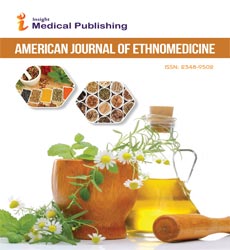ISSN : 2348-9502
American Journal of Ethnomedicine
Importance of Traditional Herbal Medicines
Adiguel Usman*
Department of Medicine, University of Kashihara, Sousse, Tunisia
- *Corresponding Author:
- Adiguel Usman
Department of Medicine, University of Kashihara, Sousse, Tunisia
E-mail: madiosm@uab.edu
Received Date: August 09, 2021; Accepted Date: August 23, 2021; Published Date: August 30, 2021
Citation: Usman A (2021) Importance of Traditional Herbal Medicines. Am J Ethnomed Vol.8 No.7:003.
Description
By definition, the "traditional" use of herbal medicines implies important historical uses, which of course applies to many products offered as "traditional herbal medicines." In many developing countries, a large part of the population relies on traditional natural remedies and their medicinal plant banks to meet their healthcare needs. Although modern medicine can coexist with this traditional practice, herbal medicine often maintains its popularity due to historical and cultural reasons. Such products are commercially available on a large scale, especially in industrialized countries. In this modern environment, ingredients are sometimes sold for uses that have never been considered in traditional treatment systems. Although herbal medicines are subject to strict production standards in some countries, this is not true everywhere. For example, in Germany, herbal products sold as "herbal products" are the same as other pharmaceutical products in terms of effectiveness, safety and quality. However, in the United States, most herbal products on the market are sold and regulated as dietary supplements, and such products do not require pre-approval of products based on any of these standards.
Traditional Treatment Methods
The desire to master the wisdom of traditional healing systems has led to a resurgence of interest in herbal medicine, especially in Europe and North America, where herbal products have been incorporated into so-called "alternative", "supplemented", "holistic" or "comprehensive" products medical systems . In the second half of the 20th century, the growing interest in self-sufficiency led to the popularity of traditional treatment methods (including the use of herbal medicines); this was especially true in the United States. Consumer Reports have a positive attitude towards these products, largely because they believe that their source is "natural" rather than "synthetic"; they believe such products are safer than drugs and they will be used for healthy living Part of the way and can help avoid unnecessary exposure to traditional "Western medicine." Although hundreds of years of use in a traditional environment can be used as evidence that certain herbal ingredients are effective or safe, there are several issues that need to be addressed when incorporating these ingredients into modern practice. One problem is that components that were once used for symptomatic treatment in traditional medicine are now used as part of health promotion or disease prevention strategies in developed countries; therefore, acute treatment has been replaced by chronic exposure.
This means that "millennial evidence of product safety" statements about how products are currently used may be invalid. This does not specifically mean that an ingredient is being used in the product. This does not specifically mean that an ingredient is unsafe; however, it means that safety cannot be taken for granted in a modern environment. The second problem is that efficacy and effectiveness are rarely proven by modern scientific research. Evidence-based methods on this topic have only recently been implemented, and the results show that for most herbal products, there are still major knowledge gaps that need to be filled before you can convince yourself of their effectiveness. One of the most difficult problems in translating traditional herbal practices into traditional "Western" medicine is customizing recipes that contain multiple herbs and other ingredients. When the goal is to provide customized formulations, there is little incentive to standardize products for the mass market.
It will be concluded that for small farmers or traditionally trained herbalists, standardization means understanding the growth conditions, harvest time, extraction type or other material processing in order to be able to provide people with reliable active ingredients. For a large number of manufacturers or distributors selling in supermarkets or health food stores, standardization refers to the use of so-called good manufacturing practices for industrial production under specified conditions, similar to the manufacturing practices used in the production of pharmaceuticals.
Open Access Journals
- Aquaculture & Veterinary Science
- Chemistry & Chemical Sciences
- Clinical Sciences
- Engineering
- General Science
- Genetics & Molecular Biology
- Health Care & Nursing
- Immunology & Microbiology
- Materials Science
- Mathematics & Physics
- Medical Sciences
- Neurology & Psychiatry
- Oncology & Cancer Science
- Pharmaceutical Sciences
